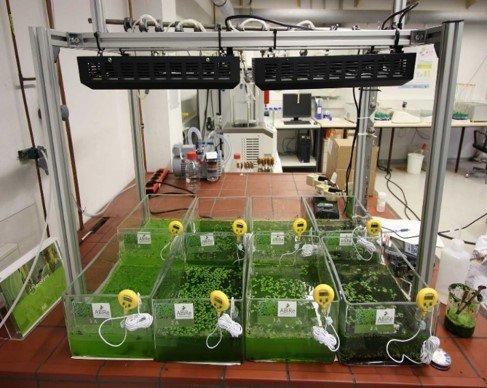Project to create a resource and CO2-neutral energy closed-loop technology from microalgae Chlorella sorokiniana and duckweed Lemna minor.

Credit: Peter the Great St.Petersburg Polytechnic University
Researchers of Peter the Great St.Petersburg Polytechnic University(SPbPU) in collaboration with Hamburg University of Technology (TUHH) completed an international joint project to create a resource and CO2-neutral energy closed-loop technology from microalgae Chlorella sorokiniana and duckweed Lemna minor.
According to professor Kerstin Kuchta, Vice president of TUHH and the project coordinator from the German side, the main objective of the project was development and implementation of an innovative approach for microalgae and duckweed bio-refinery to produce valuable products with further utilization of residual biomass for wastewater treatment and energy generation.
“In the process of project implementation, several technological solutions were developed and patented: obtaining lipids for biofuels, obtaining pectin and pigments for nutrition purposes, obtaining sorbents for water purification, as well as obtaining biogas from algae waste to generate energy,” said the professor of Higher School of Hydrotechnical and Power Engineering SPbPU, project supervisor from Russian side Natalia Politaeva.
She added that an international patent will be soon obtained on biogas technology.
“At the first stage of the projects, the main goal was to select the conditions for highly efficient cultivation of algae in the Leningrad region, Russia. Next, we developed the technology for producing valuable components from the biomass. At the third stage, our scientific group worked on the technology of obtaining and using sorbents for water purification, as well as additives for biogas production, ” the expert explained.
Both in Russia and Germany, these technologies are already implemented. In Russia, the industrial partner of the project is “Elice LLC”. A company specializing in the construction of residential areas and energy systems started to introduce the technologies for water treatment and biofuels. The German industrial partner “Sea & Sun Technology GmbH” is also involved in the implementation of developments, because the use of alternative biomass sources for the production of valuable components for the food and feed energy is higher in Germany than in Russia.
In the future, researchers plan to apply for a grant of the Russian Foundation for Basic Research and International Bioeconomy 2020 to continue the scientific collaboration. Currently, there are several joint topics on the agenda: the establishment of the biological product for waste fermentation, the establishment of biodegradable polymers, the production of a powerful antioxidant named astaxanthin, etc.
###
Media Contact
Raisa Bestugina
[email protected]




